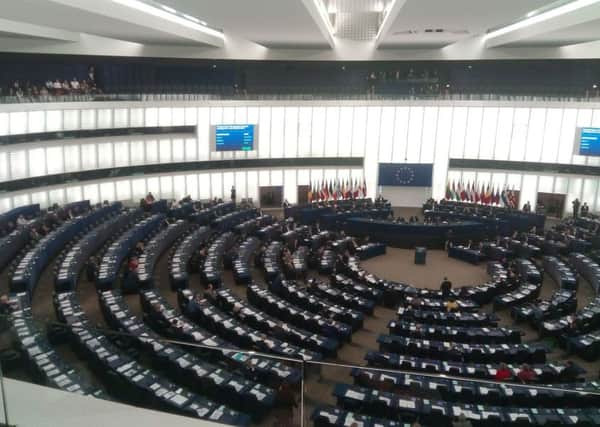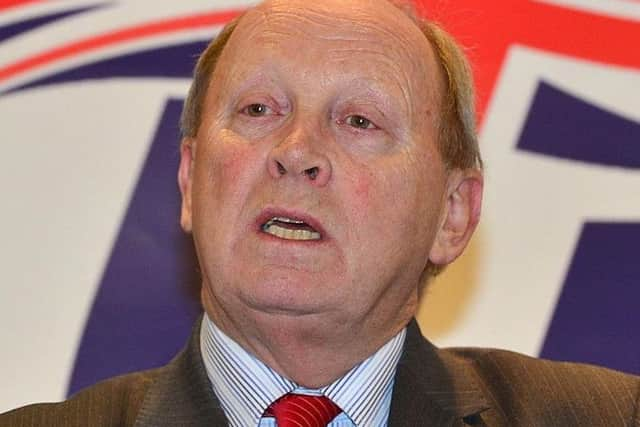Jim Allister: The DUP’s vital red line on stopping an Irish Sea border post Brexit is not just blurred, it is gone


The words of Arlene Foster a relatively short time ago accurately articulated a position around which all Brexiteers and unionists could unite.
And on that basis the letter from the prime minister to Jean-Claude Juncker and the accompanying Explanatory Note published today should worry all unionists, regardless of their individual position at the time of the referendum.
The DUP’s vital red line is not just blurred, it’s gone.


Advertisement
Hide AdAdvertisement
Hide AdMy litmus test for a Brexit deal has always been whether we are leaving as one nation.
Sadly, under these proposals we would not.
Para 7 (a) of the Explanatory Note states:
“Northern Ireland would align with EU SPS rules, including those relating to the placing on the market of agri-food goods. Agri-food goods entering Northern Ireland from Great Britain would do so via a Border Inspection Post or Designated Point of Entry as required by EU law, building on the provisions that already exist to support the SEU. They would be subject to identity and documentary checks and physical examination by UK authorities as required by the relevant EU rules.”
7 (b) says that:
“Northern Ireland would also align with all relevant EU rules relating to the placing on the market of manufactured goods. This would reinforce the arrangements above by ensuring that regulatory checks can be implemented at the boundary of the zone, as appropriate and in line with relevant EU law, minimising the potential for non-compliance.”
The official UK government position articulated in this document therefore makes it clear that all goods coming into Northern Ireland will have to do so via border inspection posts.
Advertisement
Hide AdAdvertisement
Hide AdNo regulatory border with the Republic, but one with Great Britain!
Leaving Northern Ireland alone in the EU’s single market like this is totally unacceptable and it is staggering that any unionist would even countenance such proposals for a moment.
Northern Ireland would remain subject to EU law, not British law, when it comes to the single market.
Laws over which we would have no say; a vassal colony of the EU. Does anyone seriously believe that nationalists will not use this as a pretext to argue that we would be better off with MEPs in a united Ireland?
Advertisement
Hide AdAdvertisement
Hide AdWe would remain under the European Court of Justice on all single market issues.
While paragraph 11 commits the government to guaranteeing Northern Irish businesses and farmers continued unfettered access to the rest of the UK market it does not say that in reverse.
In fact, it expressly says the opposite. Goods and services will be able to flow unhindered from Northern Ireland to Great Britain, but when they come from Great Britain to Northern Ireland they will be subject to checks — a key flaw in Mrs May’s proposals therefore remains.
Under these proposals Great Britain can and will diverge from EU single market rules, creating increasing severance with the rest of the UK.
Advertisement
Hide AdAdvertisement
Hide AdEven if one puts aside the very serious constitutional ramifications of agreeing to these proposals, economically they make no sense.
NISRA publish data annually as part of their Northern Ireland Broad Economy Sales and Exports Statistics.
Its analysis of purchases and imports from trade partners split by goods and services for 2016 showed that
• The total purchases from Great Britain in goods was £10,989 million while the purchases of services from Great Britain was £2,432 million.
Advertisement
Hide AdAdvertisement
Hide Ad• The total imports from the Republic of Ireland in goods was £1,995 million while the purchases of services from the Republic was £293 million.
In fact, the total purchases in goods from Great Britain (£10,989 million) dwarfed the total purchases in goods from the Republic and the rest of the EU combined (£3,959 million).
So, for sake of easy access for £1,995 million of goods from the Republic these proposals fetter £10,989 million goods from Great Britain — the very goods that stock our supermarket shelves and are part of the vital supply chain to our industry.
Doubtless we will be told that these proposals are improvement on those put forward by Mrs May because it gives the Northern Ireland Assembly a say. But let’s consider that.
Advertisement
Hide AdAdvertisement
Hide AdParagraphs 12 and 13 say that the Assembly and Executive must give their consent on an on going basis “before the end of the transition period, and every four years afterwards”. This is a recipe for instability, not stability.
This plan creates a new crisis date — 2025 — which you can see becoming the focus for Sinn Fein’s campaign for a unity referendum. It also gives them all the time they need to talk up the supposed cliff edge and a new project fear focused around that date.
At best it is very easy to see how 2025 will see Brexit become the key feature of crisis Stormont talks. Does anyone really want that?